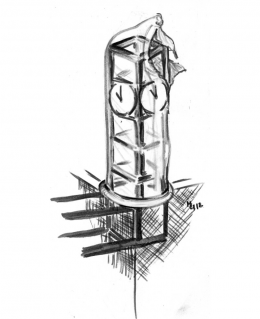
Columbia University’s Health Services announced this week that it created a fund that allows students to get the medical treatment they need without their parents or anyone else finding out. Through this new fund, Columbia students can get abortions. This service, while controversial, is one we believe is laudable.
For the university to recognize the fact that college students do not, as a demographic, engage in safe sex as often as they should, and to offer a private way to confront the often tragic reality is commendable. We only wish our own university would make it easier for students to practice safe sex, because right now we are not doing enough.
So far, Binghamton University has done little besides talk. Last Friday, the health and wellness studies department held a safe sex seminar. Among other things, the seminar stressed the importance of getting tested for sexually transmitted diseases.
But, as it stands now, the school recommends that students go to the Broome County Health Department for complimentary testing.
To be fair, Health Services does offer tests for HIV/AIDS — at an added cost not disclosed on their website. And while the county STD testing is free, the clinic its pretty far down Front Street — inaccessible directly through any bus routes — and only offers testing on Tuesdays with limited hours. On top of that, the wait times are often hours long. These limited options are simply not enough.
We’re not saying Binghamton Health Services should start offering walk-in abortions. We’re simply saying that talking about safe sex is not enough. Providing a convenient, on-campus way to allow students to know whether they are safe is not too much to ask.
The University should act not just as teachers of general ideals, but as active protectors of the mental and physical well-being of students. Talking about STD testing at seminars is helpful, but won’t get students to actually go get tested. A free, walk-in STD clinic on campus will.
We are a school of 15,000 students. Students here, like everywhere else, aren’t always as smart about sex as they should be. Too many drinks Downtown, the notion that ‘the pill’ is good enough and the pervasiveness of the hook-up culture all contribute to lowered standards for safe sex on campuses across the country. And even consistent condom use isn’t a fool-proof method of STD prevention.
Many schools confront this reality by offering free STD tests. Ours does by flooding resident assistant offices with baskets full of condoms.
But STD testing can easily slip under students’ radars. Many students figure that if they don’t wake up with a rash or genital warts, they’re probably in the clear. Even for those who know that diseases can be asymptomatic but still contagious, taking hours out of one’s day and missing class just to get tested is something many students won’t do. That’s not the way it should be, but it’s the way it is.
The school seems to think that just telling students to get tested means they’ll flock Downtown the next Tuesday; that offering condoms means students will always wear condoms; and that, if students don’t seize those opportunities, it’s on their shoulders.
It’s time for the University to address the discrepancy between talking about it and doing it, and between doing it and doing it safely. We need tests and we needed them yesterday.


